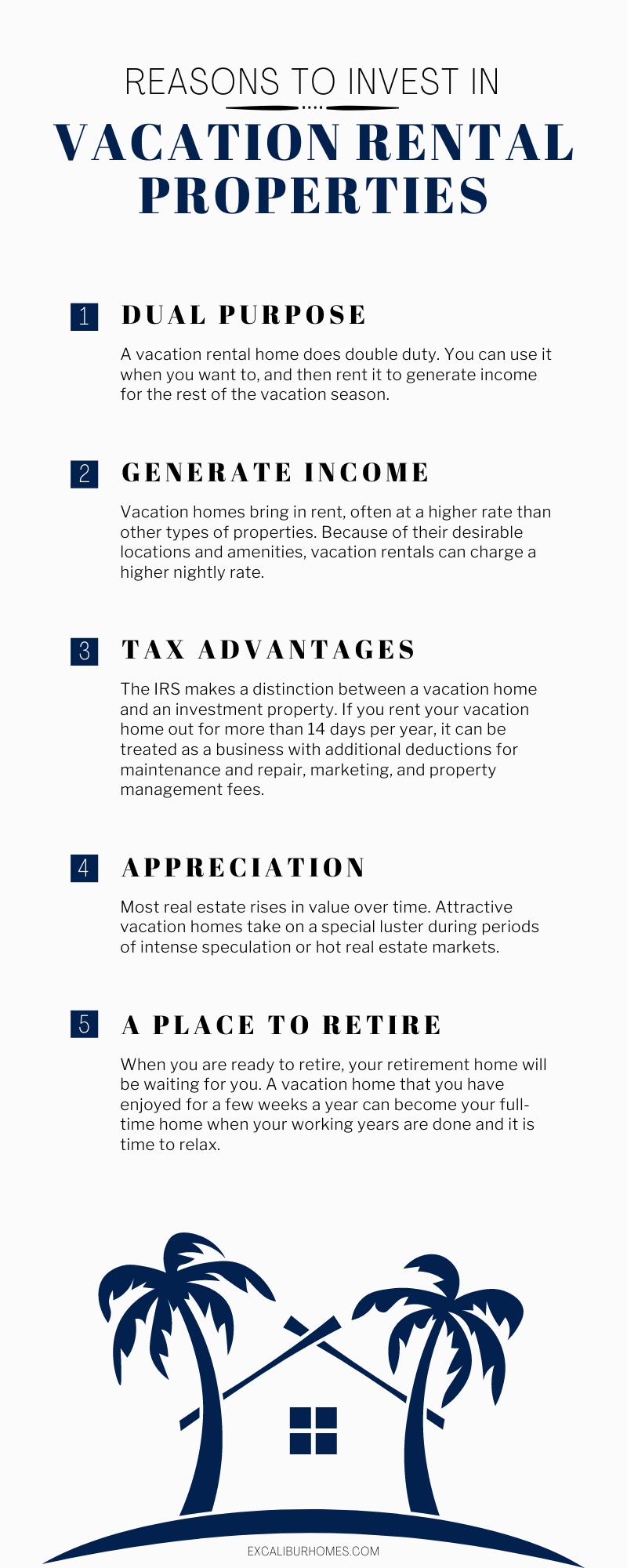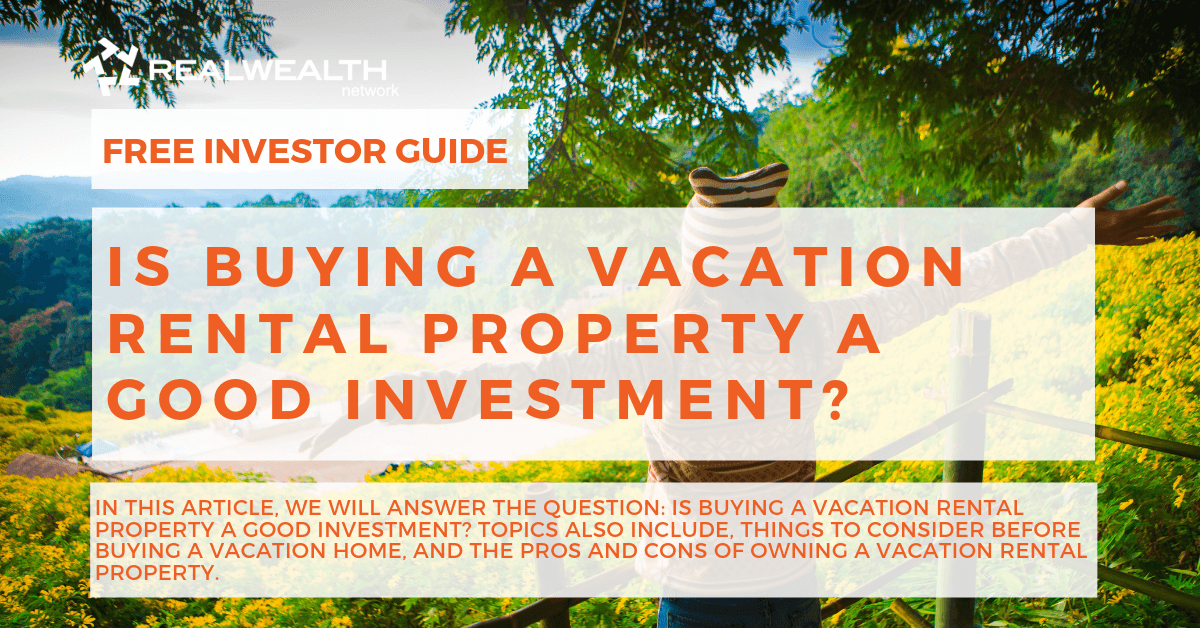Vacation Rental Investments: The Ultimate Guide to Smart Property Investment
Vacation rental investments have surged in popularity in recent years, offering lucrative opportunities for property investors. Platforms like Airbnb and Vrbo have transformed the way people travel, and they’ve also changed the landscape for investors looking to capitalize on short-term rental income. If you’re considering entering the vacation rental market, this detailed guide will help you understand the benefits, risks, and strategies to succeed in this exciting investment space.

What is a Vacation Rental Investment?
A vacation rental property is a short-term rental property rented out to travelers or tourists for vacation purposes. Unlike traditional long-term rentals, vacation rentals are typically leased for short periods, ranging from a few days to a few weeks. These properties can be anything from a small apartment or home to a luxury estate in a popular tourist destination.
Investors who buy vacation rental properties benefit from the opportunity to earn income through rental fees while also holding a valuable asset that may appreciate over time.
Why Invest in Vacation Rental Properties?
Investing in vacation rental properties comes with a range of benefits. Here’s why more investors are diving into this space:
1. High Rental Yields
Vacation rentals, especially in popular tourist destinations, can generate higher rental income compared to traditional long-term rentals. The demand for short-term stays, especially during peak seasons, can significantly boost your earnings.
- Example: A beachfront property or a cabin near ski slopes can command premium nightly rates during peak seasons.
2. Flexibility and Control
Unlike long-term rentals, vacation rentals provide more flexibility for the owner. You can choose to use the property for personal vacations during off-peak seasons, or rent it out for a steady stream of income. This flexibility allows you to adjust your investment strategy based on market conditions and your own preferences.
3. Property Appreciation
Over time, your vacation rental property may appreciate in value, especially if it’s located in a high-demand area. This offers the potential for a significant return on investment (ROI) when you decide to sell the property in the future.
4. Diversification of Investment Portfolio
Vacation rental investments are an excellent way to diversify your investment portfolio. By adding real estate to your mix of stocks, bonds, and other assets, you can reduce the overall risk of your portfolio and potentially increase its long-term returns.
5. Tax Benefits
In many regions, property owners can claim deductions for various expenses related to their vacation rental property, including mortgage interest, property taxes, insurance, maintenance costs, and even some utilities. Always consult with a tax professional to maximize your tax advantages.

Key Considerations Before Investing in Vacation Rentals
Before diving into vacation rental investments, it’s important to evaluate various factors that can impact the success of your investment. Here are the key considerations:
1. Location, Location, Location
The location of your vacation rental property is perhaps the most important factor to consider. Properties in popular tourist destinations, near landmarks, beaches, or ski resorts tend to attract more visitors and generate higher rental rates.
Consider factors such as:
– Proximity to attractions (e.g., beaches, theme parks, hiking trails)
– Access to transportation (e.g., proximity to airports, public transit)
– Local tourism trends and the seasonality of demand
A well-located property can be booked consistently, maximizing your return on investment.
2. Understanding Local Regulations
Vacation rental regulations can vary greatly depending on the location. Some cities have strict laws governing short-term rentals, including limits on the number of days you can rent out your property, zoning restrictions, or requirements for licenses.
It’s crucial to research and understand the local short-term rental laws before purchasing a property. Failure to comply with these regulations can result in fines or the inability to operate as a vacation rental.
3. Upfront Costs and Financing
Investing in vacation rentals often requires significant upfront costs. These may include:
– Down payment: Many vacation rental properties require a larger down payment compared to traditional homes, typically 20-25%.
– Renovation costs: You may need to invest in renovations to make the property attractive to potential renters.
– Furnishing and decor: Since vacation rentals are typically fully furnished, you’ll need to budget for quality furniture and decor to create an appealing space for guests.
Additionally, securing financing for a vacation rental can be different than obtaining a traditional mortgage. Be sure to shop around for lenders who specialize in investment property loans.
4. Maintenance and Management
Vacation rental properties often require more upkeep than long-term rentals due to the high turnover of guests. Regular cleaning, maintenance, and quick repairs are essential for maintaining guest satisfaction and positive reviews.
- Self-management: If you manage the property yourself, you’ll need to handle bookings, guest communications, cleaning schedules, and maintenance.
- Property management companies: If you’re not local or prefer not to handle daily operations, consider hiring a property management company. These companies charge a fee (typically 10-30% of the rental income) but can manage all aspects of the property for you.
5. Seasonality and Occupancy Rates
Some vacation rental markets are highly seasonal, meaning that your rental income may fluctuate depending on the time of year. It’s essential to understand the peak and off-peak seasons for your location to set appropriate rental rates and manage your occupancy rates effectively.
Keep in mind that even in high-demand locations, factors like local events, weather, and broader economic conditions can impact occupancy.

How to Maximize Your Returns from Vacation Rentals
To ensure your vacation rental investment is profitable, you’ll need to adopt strategies that maximize occupancy and rental income. Here are some expert tips for achieving the best results:
1. Create an Attractive Listing
A well-crafted listing can make all the difference in attracting renters. Invest time in creating an appealing property description with high-quality photos. Highlight unique features, amenities, and nearby attractions to make your listing stand out.
- Include detailed information about the property, such as the number of bedrooms, bathrooms, and any special amenities like a pool, hot tub, or outdoor space.
- Utilize high-quality images that showcase the property’s best features.
2. Pricing Strategy
Setting the right price is key to maximizing your vacation rental income. Research competitive listings in your area to understand market rates, but also consider factors like property size, amenities, and location.
- Use dynamic pricing tools, such as PriceLabs or Beyond Pricing, to adjust rates based on demand, seasonality, and local events.
- Offer competitive pricing during the off-peak season to maintain occupancy.
3. Offer Excellent Guest Service
Guest satisfaction is vital for gaining positive reviews, which can in turn drive future bookings. Ensure that your property is clean, well-maintained, and well-stocked with essential amenities such as towels, toiletries, and kitchenware.
- Respond quickly to guest inquiries and issues.
- Consider providing local recommendations for dining, activities, and attractions to enhance the guest experience.
4. Diversify Your Marketing Channels
While Airbnb and Vrbo are the most well-known platforms for vacation rentals, don’t limit yourself to just one listing site. Expand your marketing efforts by listing your property on multiple platforms such as Booking.com, TripAdvisor, and Expedia to reach a wider audience.
- Create a website or social media profiles to showcase your property and attract direct bookings, reducing reliance on third-party platforms.
5. Seasonal Promotions
Offering special promotions during off-peak seasons can help maintain a steady flow of guests year-round. Consider offering discounts for extended stays or last-minute bookings to boost occupancy during slower periods.
FAQs About Vacation Rental Investments
Q1: Is a vacation rental a good investment?
A1: Yes, vacation rentals can offer higher rental yields compared to traditional long-term rentals. However, success depends on location, property management, and local regulations. Proper research and planning are key.
Q2: How do I finance a vacation rental?
A2: Financing a vacation rental typically involves a higher down payment (usually 20-25%). You can apply for a buy-to-let mortgage or an investment property loan, depending on your lender and location.
Q3: What are the risks of vacation rental investments?
A3: Risks include fluctuations in demand, local regulations, maintenance costs, and the potential for periods of vacancy. Managing these risks involves selecting the right location, understanding the market, and effective property management.
Q4: Can I use a vacation rental for personal use?
A4: Yes, vacation rentals offer the flexibility to use the property for personal vacations during off-peak times. However, the income from renting out the property will be impacted during these periods.
Q5: How much should I charge for my vacation rental?
A5: Your pricing should reflect market rates in your area. Use pricing tools and competitor research to determine the right rental rate based on the property’s size,
location, and amenities.
Conclusion
Investing in vacation rentals can be a highly rewarding venture when approached with the right strategy. From generating passive income to benefiting from property appreciation, the rewards are significant. However, it’s important to carefully consider the location, local regulations, and ongoing management requirements. By following the expert tips outlined above, you can make informed decisions and position yourself for long-term success in the vacation rental market.
For more information on vacation rental management and investment tips, explore further resources on platforms like FortuneBuilders.

